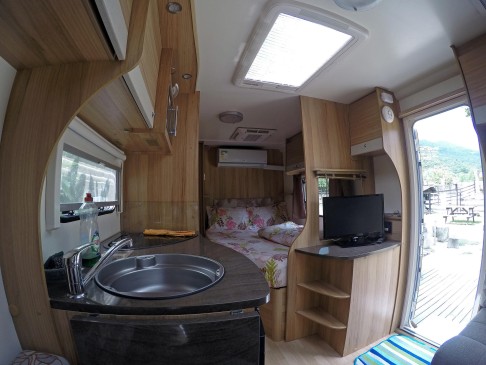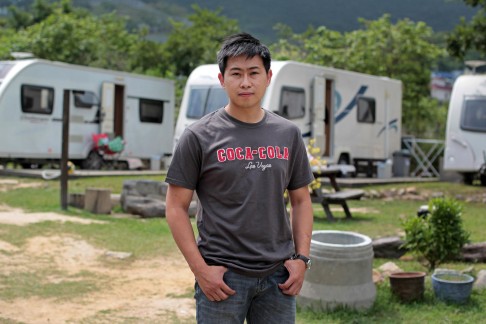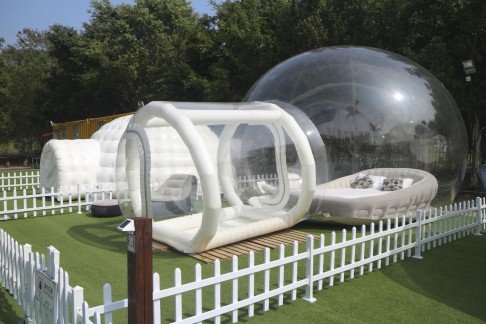
Hong Kong mobile home holiday sites threatened by red tape
In a classic bureaucratic tangle, officials struggling to enact inflexible and conflicting regulations leave New Territories camping site operators in a catch-22
Felix Tang Ka-yue grew up close to nature in Tong Fuk on Lantau Island, where his family has been operating holiday homes for decades. So when he and four friends set up a caravan rental business about 18 months ago, it seemed like the natural step forward.
They pooled together HK$2 million, imported seven caravans from Britain and installed them in a sprawling site outside Tong Fuk village, between barbecue pits and swings and slides for children. Their idea was to give families the chance to enjoy a break in a lush, green setting - with the comforts of home. Customers don't tow the caravans away but use them as offbeat accommodation for short getaways.
The concept has proved popular with local families and Caravans Hong Kong is booked up until October.
Yet Tang and his partners have been confronted with a slew of administrative hurdles, and he wonders daily if officials will put them out of business.
Because there are no rules covering caravans, the Home Affairs Department has told them to apply for a hotel and guest house licence, but Tang finds they are caught in a catch-22 situation.
A guest house licence requires the partners to first secure approval from the Buildings Department, but the 27-year-old business management graduate has run into a brick wall there. "Buildings officials say they cannot assess my application as caravans are considered vehicles, not buildings. I am stuck in limbo now," he says.

An eco-conscious sort, Tang has taken pains to comply with safety and environmental standards. A limited number of gas tanks are stored on site to supply stoves in the caravans. Four solar panels provide electricity for all external lighting at the site and two of the camper vans, with generators powering the remaining caravans. Waste from toilets is collected in two septic tanks, which are cleared regularly by a disposal company.
The caravans pass all European Union standards and he has taken out third party insurance for his customers.
The operation has also passed inspectors' tests to ensure effluent does not leak from the tanks. Officials from the Electrical and Mechanical Services Department have cleared their installations.
Buildings officials say they cannot assess my application [for a guest house licence] as caravans are considered vehicles, not buildings. I am stuck in limbo now
Lands Department officials have no issues with the operation since the caravans are not considered permanent structures and do not come under their brief.
But despite meeting the demands of all these departments, Caravans Hong Kong has yet to secure the guest house licence the Home Affairs Department has asked for.
"I understand the Home Affairs officials are only doing their job. Maybe they received complaints from the public so they are forced to deal with the issue. But they can't tell me specifically what's wrong and just ask me to get the licence. I am willing to comply with all their requirements to make the operation legal. But they need to tell me how to do it," Tang says.
Not surprisingly, this constant runaround is wearing him down and dampening his enthusiasm.
"The government keeps saying it wants to boost an entrepreneurial spirit among young people, but officials not only fail to support young people in pursuing their dreams, they stand in the way."

Officials not only fail to support young people in pursuing their dreams, they stand in the way
Tang's pursuit of his dream began with lots of promise. Having always enjoyed the outdoors, he and his family celebrated his graduation from the University of Hull by going on a caravan holiday around Europe, including Britain, the Netherlands, Denmark and Sweden.
"We were very happy making that trip. Talking with some of my dad's friends after returning to Hong Kong, I learned they no longer went camping as their children didn't like sleeping in tents because it was rough and hot and there were lots of mosquitoes. So I hit on the idea of providing caravans so families can sleep in cosy surroundings with air conditioning, TV, kitchen and toilet."
Tang and his partners initially parked their caravans on a plot in Shui Hau Bay, also on Lantau Island, which his grandfather had rented for years. They put in thousands of pineapple plants to add fruit picking to the range of leisure options, but had to uproot the venture when environment officials declared that the site had ecological value.
Fortunately, they found a new 11,000 sq ft site through another friend, and rent it for HK$10,000 a month. A sustainable energy enthusiast, Tang hoped to gradually convert his site entirely to renewable sources but that seems unlikely now.
"I bought a wind turbine but don't dare install it as the set-up would be considered a permanent fixture, breaching Lands Department rules."
Citing calls from people interested in buying their own caravans, Tang says he was keen to set up sites that owners could drive to in their own camper vans. A common practice in Europe, it has also become popular on the mainland.
In Tin Shui Wai, the Mingle Farm holiday camp is staring at a similar regulatory black hole that may swallow up its 200,000 sq ft operation. Offering a mix of accommodation from fun inflatable cabins and a bubble-like "ecosphere" to caravans and luxury tents with regular beds, air conditioning and heating, it also struggles for legal status.

Set up last October, Mingle Farm bills itself as an eco-farm (it has installed a few solar panels) and has applied for a licence to run a holiday camp. However, the unconventional operation has stumped government regulators and their legal status has become a stumbling block, a Mingle spokeswoman says.
In Hong Kong, only those holiday camps run by the Jockey Club and other organisations in Tai Mong Tsai and other rural areas are legal.
Mingle Farm, on the other hand, has inflatable tents and caravans. It does not have water and electricity supply and must bring in water wagons and use generators for electricity, while waste is collected by disposal companies, she says.
"No one has done this kind of thing before. There's a legal vacuum regarding ventures like ours."
Like Caravans Hong Kong, it has not been able to secure a hotel and guest house licence as the Buildings Department won't assess its installations because the structures are not permanent.
"Government departments lack coordination between themselves," the Mingle Farm spokeswoman says.
No one has done this kind of thing before. There's a legal vacuum regarding ventures like ours
"Our company has 10 years' experience running hotels and asked the Home Affairs Department about regulations before opening. But no one could give us answers.
"We understand the government has to be strict in regulating [our operation] and officials are in a difficult position. If they are too lenient with us, there might be a sudden rush of people starting similar camps, which could lead to waste disposal concerns. However, ever since our opening, we have had a warm response from the public. The government should keep abreast of the times and update their rules."
Ben Chan Han-pan, a legislator from the pro-establishment DAB, is also critical of the government's failure to set out rules for such enterprises.
He and his family decided to spend a weekend in one of Tang's caravans in Tong Fuk last year after his wife read about it on Facebook. They all enjoyed the experience, especially his young daughter.
"We had a lot of fun," Chan says. "We wanted to save a bit of money and decided not fly out for a holiday."
Describing Caravans Hong Kong as a welcome addition, he adds: "They just provide more [leisure] options so people can spend time with nature and enjoy stargazing at night. It's bad for the government to crack down on them when they don't affect the environment at all."
A member of the Lantau Development Advisory Committee, Chan says he has pressed planners to set out parameters for home-stay accommodation as part of measures to develop tourism on the island.
"But the government says there's no need for such regulations as Hong Kong is a small place with a big population and there's not much room for speciality tourism."
A Home Affairs Department spokesman said the law defined a "hotel" or "guest house" as any premises providing paid sleeping accommodation, and that all such premises must be licenced before they could start operating. He added that operating an unlicensed hotel or guest house was a criminal offence punishable by up to two years' imprisonment and a fine of up to HK$200,000, plus HK$20,000 for each day the offence continues.
The spokesman said the primary purpose of the Hotel and Guesthouse Accommodation Ordinance was to ensure that premises intended to be used as hotels or guest houses complied with the statutory building structure and fire safety standards.
He confirmed that the caravans at Caravans Hong Kong and Mingle Farm had not secured licenses under the Ordinance, and that the department had received reports from the public about "suspected unlicensed guest house operations [at these] locations".

